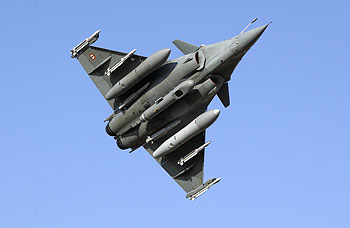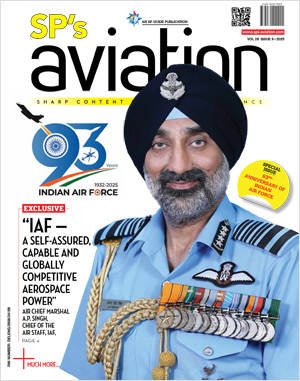INDIAN ARMED FORCES CHIEFS ON OUR RELENTLESS AND FOCUSED PUBLISHING EFFORTS

The insightful articles, inspiring narrations and analytical perspectives presented by the Editorial Team, establish an alluring connect with the reader. My compliments and best wishes to SP Guide Publications.

"Over the past 60 years, the growth of SP Guide Publications has mirrored the rising stature of Indian Navy. Its well-researched and informative magazines on Defence and Aerospace sector have served to shape an educated opinion of our military personnel, policy makers and the public alike. I wish SP's Publication team continued success, fair winds and following seas in all future endeavour!"

Since, its inception in 1964, SP Guide Publications has consistently demonstrated commitment to high-quality journalism in the aerospace and defence sectors, earning a well-deserved reputation as Asia's largest media house in this domain. I wish SP Guide Publications continued success in its pursuit of excellence.
- A leap in Indian aviation: Prime Minister Modi inaugurates Safran's Global MRO Hub in Hyderabad, Calls It a Milestone
- All about HAMMER Smart Precision Guided Weapon in India — “BEL-Safran Collaboration”
- India, Germany deepen defence ties as High Defence Committee charts ambitious plan
- True strategic autonomy will come only when our code is as indigenous as our hardware: Rajnath Singh
- EXCLUSIVE: Manish Kumar Jha speaks with Air Marshal Ashutosh Dixit, Chief of Integrated Defence Staff (CISC) at Headquarters, Integrated Defence Staff (IDS)
- Experts Speak: G20 Summit: A Sign of Global Fracture
Mother of All Deals Recedes into History
The Indian Air Force should have good reason to believe that it will, in due course, get the number of Rafale combat jets it requires.
 |
By Air Marshal B.K. Pandey (Retd) Former Air Officer Commanding-in-Chief of Training Command, IAF |

The nation can certainly expect many more of such pleasant surprises from the Prime Minister.

The visit of Prime Minister Narendra Modi to France from April 09 to 12 this year had raised hopes for the Indian Air Force (IAF) that the stalemate in the long awaited deal pertaining to the 126 Rafale medium multi-role combat aircraft (MMRCA) wound finally be broken. While repeated assurances continued to emanate from the corridors of power that the contract negotiations in the MMRCA deal were continuing and hopefully the impediments to finalisation of the deal would be out of the way soon, the proposal for 126 Rafale fighter jet deal with Dassault Aviation and the state visit of the Indian Prime Minister to France were two separate issues which could not be linked.
However, during the joint statement in Paris on April 10, 2015, Prime Minister Narendra Modi sprung a surprise by his public statement that the President of France Francois Hollande had accepted his request for France to supply 36 Rafale combat jets to India directly in fly-away condition. Once again, this too was not linked with the deal for 126 Rafale MMRCA that appeared to have got bogged down over some seemingly irreconcilable issues; but till then, was not regarded as an aborted endeavour. There was thus excitement in some quarters on the possibility that the Indian Air Force (IAF) could eventually receive a total of 162 Rafale jet fighters (126 plus 36).
On the evening of April 13, 2015 however, instead of an announcement about the deadlock in the contract negotiation being broken, on account of a statement by the Minister of Defence Manohar Parrikar on CNN IBN, the MMRCA contract itself lay shattered along with dreams that the IAF had been nurturing since 2007 when the Request for Proposal (RFP) for MMRCA was issued by the Ministry of Defence. During the interview with CNN IBN, the Minister of Defence literally dropped a bombshell when he stated that all future deals for Rafale fighters would also be through Government-to-Government route, indicating that the MMRCA tender for 126 Rafale aircraft, the cost of which had escalated from $10.4 billion to over $20 billion, had been cancelled. The Minister went on to state that “The contract negotiations for 126 Rafale MMRCA had entered into a loop or a vortex with no solution in sight”. The Minister also made a damning observation on the Defence Procurement Procedure (DPP) when he said “Scope was only possible in Government-to-Government deal. Instead of going through the RFP route where there was lot of confusion and chaos, it was decided that we will go through the Government-to-Government route".
It would be pertinent to mention here that this observation by the Minister of Defence is not without basis. Since its implementation, only one case of procurement of equipment by the IAF, of the Pilatus basic trainer aircraft, has been completed successfully through DPP. As against this, a number of acquisitions for the IAF have been made successfully through the Government-to-Government route. These include the Boeing Business Jets, C130 Super Hercules and C-17 Globemaster III strategic airlift aircraft. May be it is time the Government examines whether a DPP is really required as defence procurements being related to national security could be handled more efficiently through the Government-to-Government route. This has been demonstrated once again in the case of the Rafale combat jets.
Procurement of 36 Rafale fighter jets within two years in fly-away condition would certainly be a matter of relief for the IAF especially in the context of the rapidly dwindling combat fleet. However, this number is much too small to boost the operational capability of the IAF to enable it to fight a two-front war. Besides, the number is too small to justify the expenditure the IAF would have to incur on creation of maintenance and training infrastructure as also on manpower. There are however indications that the Government will not stop at 36 as implicit in the words of the Minister of Defence when he said "I think it is a bold decision and I will give 100 out of 100 to the Prime Minister. Many people politically fail to take decision. But the need of the nation comes first. What Prime Minister Modi has done is that he has got a deal for 36 aircraft. We will negotiate and will buy more. The ice has been broken".
The finesse with which the Prime Minister Modi has managed to end the uncertainty about the procurement of Rafale fighter jets is a clear indication of the priority his Government attaches to national security. The IAF should have good reason to believe that it will, in due course, get the number of Rafale combat jets it requires.
The nation can certainly expect many more of such pleasant surprises from the Prime Minister.





